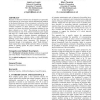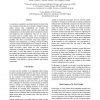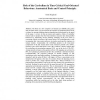167 search results - page 31 / 34 » Simulating a Human Cooperative Problem Solving |
117
click to vote
ACMACE
2006
ACM
15 years 8 months ago
2006
ACM
Research in Interactive Narrative has developed new approaches to the behaviour of virtual actors, but has dedicated little attention to the physical behaviour of the environment ...
107
click to vote
ICRA
2003
IEEE
15 years 8 months ago
2003
IEEE
Locomotion is considered as most basic function of robots. In the case of ordinary robots, they are not needed to change locomotion pattern because their configurations are consta...
110
click to vote
CGF
2008
15 years 2 months ago
2008
Aging has considerable visual effects on the human face and is difficult to simulate using a universally-applicable global model. In this paper, we focus on the hypothesis that th...
125
click to vote
GECCO
2006
Springer
15 years 6 months ago
2006
Springer
Two mathematical and two computational theories from the field of human and animal learning are combined to produce a more general theory of adaptive behavior. The cornerstone of ...
153
click to vote
NEUROSCIENCE
2001
Springer
15 years 7 months ago
2001
Springer
The Brain is a slow computer yet humans can skillfully play games such as tennis where very fast reactions are required. Of particular interest is the evidence for strategic thinki...




